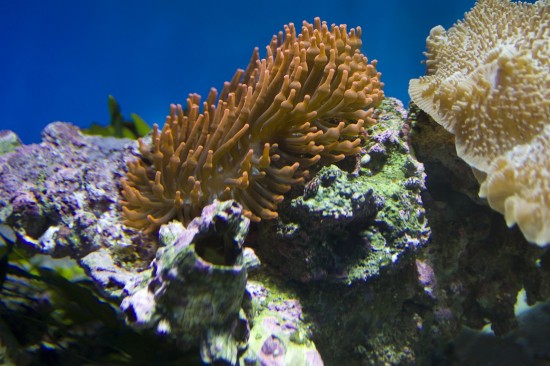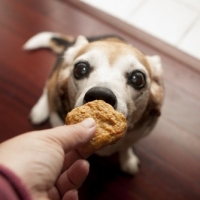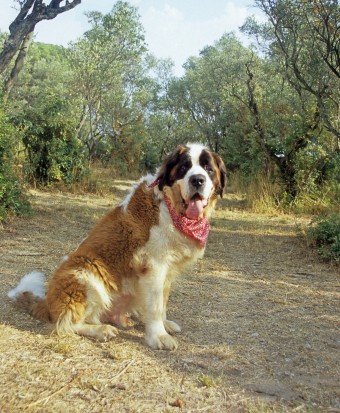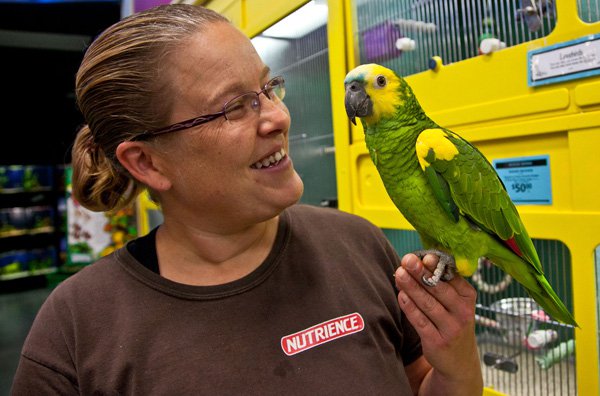
The Bible and The Chronicles of Narnia talk about companion animals
What the Bible says about the role of animals in our lives
In Genesis chapter 1, God made man in His own image, and then gave man dominion over the fish of the sea, the birds of the air, the cattle, and all the earth and every creeping thing on it. Dominion means 揷ontrol?or 搒overeignty,?but what exactly God meant by it is open to some interpretation. We do know that humans did not eat animal flesh until after the Flood. Noah was instructed to take on the ark two of every unclean animal and seven of every clean animal. Why did Noah need extras of the clean animals? Some were for burnt offerings on an altar Noah built after the ark came to rest. But God also told Noah, 揈very moving thing that lives shall be food for you. I have given you all things, even as the green herbs.?(Genesis 9:3)
Think about it. When Noah and his family disembarked from the ark, the earth was a wasteland. There were no crops, nor wild plants to be harvested for food. It was a matter of survival梕at the animals or starve. What the Bible does not tell us is whether Noah抯 family and their descendants were supposed to continue eating animals even after their crops were established.
Over the history of civilization, many societies have had to depend upon the hunting of animals for their survival桽tone Age people, before cultivation was learned; the Native Americans, who had to follow the seasonal food supply; white pioneers, who settled in places where no crops had been planted; Eskimos, who live in an environment too harsh for agriculture. Anyone who accepts that man is made in God抯 image, and that God has given man dominion over animals, should be able to accept that human survival takes priority over animal survival. But whether it is appropriate for people, here in the prosperous West, to eat animals as a matter of choice, no one can claim to know for certain. As human survival becomes easier over time, we can afford to elevate the status of our animals, especially our companion animals.
The talking animals of Narnia
C.S. Lewis is one of the most popular and readable theologians ever. Both children and adults enjoy his Chronicles of Narnia, an imaginative illustration of Christianity. I am going to assume that my readers either have read the series, or, at the least, have enough familiarity with it that not a lot of background information is needed here. (If you haven抰桰 recommend it!)
In The Silver Chair, earthlings Jill and Eustace, with their Narnian companion Puddleglum, are the guests of some seemingly hospitable but (unbeknownst to our heroes) scheming giants who have been employed by the evil White Witch to sidetrack them from their mission of freeing Prince Rilian from her bondage.
As the protagonists enjoy their lunch in blissful ignorance, they overhear one of the giants boast about how he killed a Talking Stag for the meal. Jill, who is in Narnia for the first time, at first does not realize the full meaning of this. But both Eustace, who has been to Narnia before and has had a life-changing encounter with Aslan, and Puddleglum, who is Narnian-born, understand the significance of the murder of a Talking Animal for food. They are horrified and lose their appetite. And Puddleglum says, 揥e抳e brought the anger of Aslan on us.?
Conclusion
God gave us dominion over animals. But sovereignty and control do not imply thoughtless use and abuse. Many people, in good conscience, exercise the choice of eating animals caught or raised for that purpose. My conviction is that there is a crucial difference between animals considered 揻ood?animals and those considered 揷ompanion?animals. While our peasant or pioneer ancestors may have kept a cow for milking and ultimately, when Bessie or Duchess waxed too old to be a valued producer, she ended up on the dinner table, those people generally had fewer choices about what to eat than do 21st-century Americans.
The argument that humans need to eat animal products does not hold either Biblically or an evolutionarily. As we have seen, humans did not eat animals until after the Flood梡erhaps 1,000 years. If the Bible is to be taken literally, people in those days typically lived for hundreds of years. And if humans did in fact descend from other primates, we are not meat-eaters, because humans are not equipped with either the teeth and jaw structure or the digestive system of meat-eating species. People eat meat for one of two reasons梩hey have nothing else to eat, or they simply want to.
The alternative argument that a horse that has outlived its usefulness 搈ight as well?be eaten doesn抰 work, either. Beloved pets are given respectful burials, not unlike humans, except in the rare cases where the alternative is starvation. (Every student has heard of the Donner Party.)
揥e抳e brought the anger of Aslan on us.?That pretty much summarizes the idea of using companion animals for food.
 Your Marine Aquarium And Live Rock
Your Marine Aquar
Your Marine Aquarium And Live Rock
Your Marine Aquar
 Most Popular Pet Services In London
In this day and age when austerity has become the norm,
Most Popular Pet Services In London
In this day and age when austerity has become the norm,
 Pet Insurance : Five Ways To Keep Your Policy Cost Down Without Compromising On Coverage
Pet Insurance : F
Pet Insurance : Five Ways To Keep Your Policy Cost Down Without Compromising On Coverage
Pet Insurance : F
 8 Good Reasons Why Adding Olive Oil To A Dogs Diet Works
8 Good Reasons Wh
8 Good Reasons Why Adding Olive Oil To A Dogs Diet Works
8 Good Reasons Wh
 All You Need To Know About Ulcer In Horses
All You Need To Know About Ulcer In Horses
Ulc
All You Need To Know About Ulcer In Horses
All You Need To Know About Ulcer In Horses
Ulc
Copyright © 2005-2016 Pet Information All Rights Reserved
Contact us: www162date@outlook.com